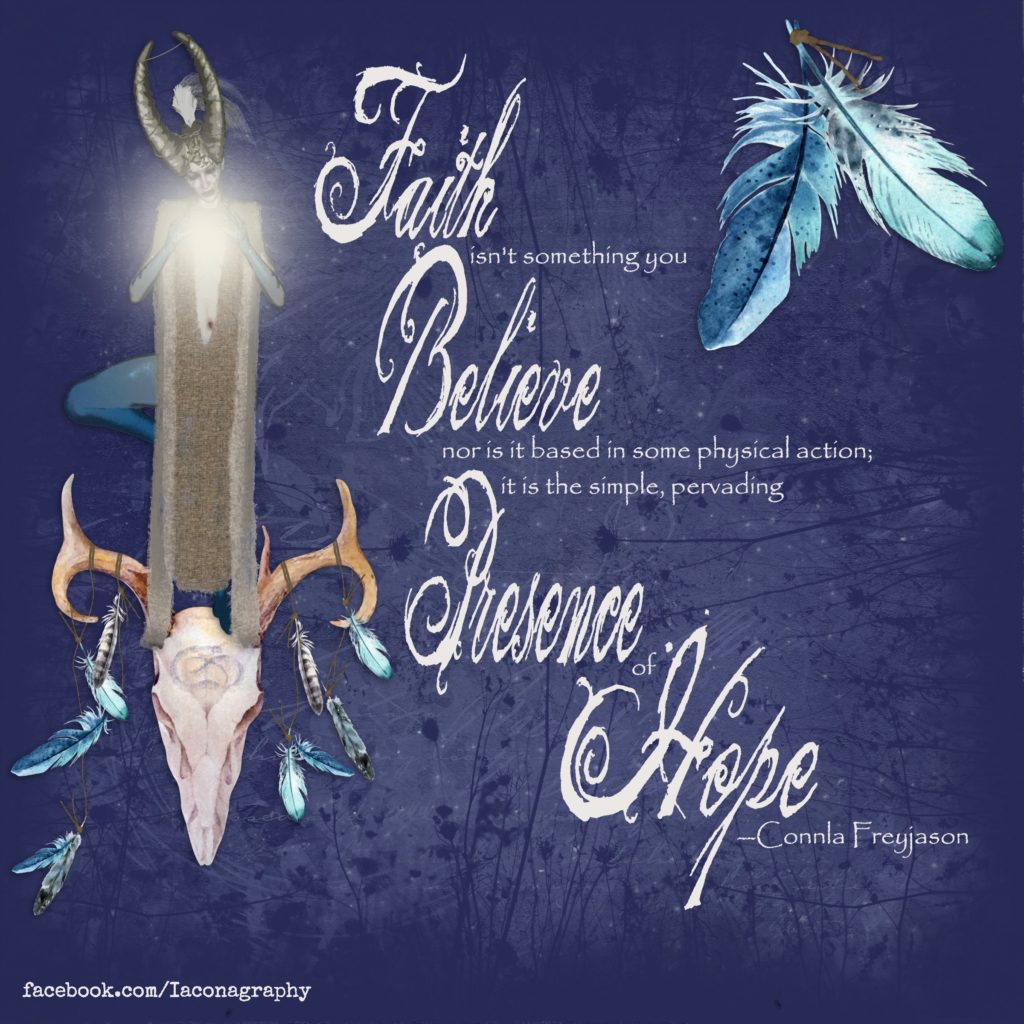Struggling Faith

Faith. It’s a word that often gets looked down upon in traditional Heathen circles, yet it is something with which we all struggle, regardless of our chosen spiritual path in life. Many modern Heathens sneer down their noses at it, saying that as a concept it smacks of someone’s “Christian upbringing”, yet it can be found scattered throughout the Eddas and Sagas, and when we do not feel it coloring our daily lives, we tend to become listless beings; we suddenly feel lost. In fact, one of the most frequently posed conundrums that I encounter is this one:
How does one get out of a “faith rut”?
I personally believe that the number one reason that we fall into “faith ruts” in the first place is due to how we have come to define the concept of faith. That overriding definition of the concept is also intrinsically bound up with that tendency for people to sneer down their noses at it in certain circles, because the primary word we find linked with faith is belief. This leads us down the garden path to that ages-old issue of the dreaded blind faith: adhering to something without any true understanding, perception, or discrimination. But faith is not belief: it’s more than that.
In Pagan and Catholic circles, faith also tends to become bound up with action or doing: when one is not routinely performing the actions of one’s chosen spiritual path, one feels that they have somehow lost faith, and fallen into a “faith rut”. Such actions might include attending Mass regularly or saying the rosary, if one is Catholic, or attending rituals and doing workings, if one is Pagan. For those of us on a Norse Path, these actions include offering blot, working with the runes, or perhaps performing galdr. But faith is not action or doing: it’s more than that, too.
Faith is the simple, pervading presence of hope.
Unfortunately, hope is another word that we tend to misdefine in our society:
Hope: to want something to happen or be true; to desire with expectation of fulfillment
Basically, we confuse the concept of hope with wishing. There are deeper definitions of the word, however, which ring closer to the truth of it, as a concept:
Hope: to cherish with anticipation; to expect with confidence; trust; reliance
I find it quite telling that those last two words–trust and reliance–are listed as the archaic definition of hope. No wonder so many people are out here falling into “faith ruts”, when we’ve lost the very meaning, not only of the word faith, but of that which is at its core: hope!
The five keys to hope are italicized in that last definition:
- cherish
- anticipation
- confidence
- trust
- reliance
We tend to think of the word cherish when thinking of loved ones and pets: it has become, not unlike faith and hope, a somewhat sappy thing, drained of its original meaning. What it ultimately means, however, is to hold something constantly in your mind and heart with esteem. Things which are cherished are not only loved, they are also respected. They become ultimate to us. What does that mean, to “become ultimate”? It means that those things become fundamental to the basis of our very existence: they are of central importance, defining and supporting our total concept of how the world and the universe actually work to a degree that we would feel lost without them. Which is why, when we lose the concept of the word cherish and at the same time have nothing in life that we actively do cherish, we begin to fall into a “faith rut”.
But according to that definition of hope back there, we not only cherish, we do so with anticipation. Anticipation is the act of looking forward with pleasurable expectation: it looks for the best in things, rather than the worst. Looking forward which focuses on the worst outlook is the antithesis of anticipation. We have a word for that, too. We call it dread! Cherishing with anticipation is how we can look out the window today, and see trees covered in ice, and think “My Gods, that’s beautiful”, instead of “holy crap, we’re gonna lose power and I’m gonna freeze to death”. The first thought is cherishing with anticipation–it focuses on the best, rather than the worst–while the latter thought is cherishing with dread. Cherishing with dread instead of anticipation is another way in which we begin to fall into a “faith rut”.
“Expecting with confidence” is part of how the concept of hope gets confused with wishing: we tend to focus on the expecting part of that sentence, and ignore the confidence that comes after it wholesale. We all go through life expecting things: I expect to be successful with my business, for example. You might expect to win the lottery. But when we add confidence into that equation, our feeble wishes get elevated into something far greater: they become hopes. Now, confidence is defined as the feeling or belief that one can rely on something or someone–firm trust–and also as the feeling of self-assurance arising from one’s appreciation of one’s own abilities or qualities. When speaking about spirituality, somehow we tend to divorce those definitions from each other: too often, people arrive at a worldview wherein you have to choose whether to believe in a Higher Power (that first bit, that we can firmly trust and, therefore, rely on someone or something greater than ourselves), or to believe in one’s self. But the definition is not an or statement, it’s an and statement! True confidence, as a key to hope, requires that we do both: rely, and, therefore, firmly trust in a Higher Power while at the same time feeling self-assured, thanks to an appreciation of our own abilities and qualities. When we treat the definition of confidence as an or statement, losing our appreciation of ourselves, and thereby coming to doubt ourselves, while focusing solely on that Higher Power part of the equation, once again, we begin to fall into a “faith rut”.
Which brings us finally to trust and reliance. When we speak of that first word, we tend to think of it in an either/or fashion, because once again, we bind it to the concept of belief. Trusting is what we do when we know something can be believed; when we know something is true. As with every other bolded word in this blog post, the actual meaning of the word trust goes way, way deeper than that, however. The deepest meaning of the word trust is to live without fear. But how in the heck can we do that when the world is such a scary place? Newsflash: the world has always been a scary place! Our Ancestors unlocked the way to live without fear when they “discovered” something larger than solely themselves to rely upon. Yes, I’m talking about a Higher Power! What you choose to call that really makes zero difference to me; It all boils down to the same thing anyway. That reliance, shockingly, also has zero to do with belief: whether you believe in Them or not matters not in the slightest; what matters is that you believe in you enough to be worthy of Them believing in you, too! When we lose these definitions of trust and reliance, once again, we fall into the dreaded “faith rut”.
I didn’t figure all of this out just today, in an attempt to write a pithy blog post that might get all of you thinking and feeling and perhaps shopping while you’re here. No, I figured all of this out quite slowly and painfully over the course of the past year, and I was forced to figure it all out because I did not simply stumble into a “faith rut”, I was pushed, ass over teakettle, into a faith chasm. On December 23, 2015, our family dog died. Two days before Christmas–her presents already bought and waiting to be put into her stocking–she succumbed to convulsions, and our family was shattered. That may seem like a very small and insignificant thing: the death of the family dog. Even to a dog-lover, that may seem like quite a tiny thing to qualify as the gateway to a faith chasm. Yet, that’s what it was, for me.
You see, I prayed to practically every God I could think of to save her, not because I was going to miss the family dog, but because of what this was going to do to our family as a whole. There is, after all, no pain in the world quite like grief at Christmas. And then I was expected to go sit in a pew and celebrate the birthday of one of those Gods, as if nothing had happened; as if my prayers had not been heard and yet gone unanswered. The whole thing smacked of the most vile hypocrisy, and I wanted no further part in it, if that’s what religion entailed. Bingo: faith chasm.
I have come, over the course of the past year, to realize, however, that my plummet into the faith chasm had far less to do with the surface issue of losing our dog coupled with unanswered prayers than to do with my own misdefinition of what faith actually is, and, within that misdefinition, my mistranslation and utter lack of hope. Hope was actually something I had lacked for a very long time at that point, it just took the death of the family dog to bring that sharply into focus. The Gods were doing me a favor, but as is often the case, it certainly didn’t feel that way, at the time.
I found myself returning, again and again, to the most inexplicable of all sources for comfort: a passage from the Christian Bible. I would sit, head in hands, when no one was looking, and cry my eyes out, and there would be those words, over and over, echoing like a broken record:
May the God of green hope fill you up with joy, fill you up with peace, so that your believing lives, filled with the life-giving energy of the Holy Spirit, will brim over with hope! –Romans 15:13, The Message
Let me take the liberty of making that a bit more Pagan/Heidhrinn for those of you who are currently squirming in your seats:
May the God of green hope fill you up with joy, fill you up with peace, so that your spiritual life, filled with the life-giving energy of inspiration, will brim over with hope!
I have spent the last year unlocking the secrets of that mantra and climbing out of my personal faith chasm. The next six blog posts will follow me along on that journey, in an effort to help you climb out of your own.


